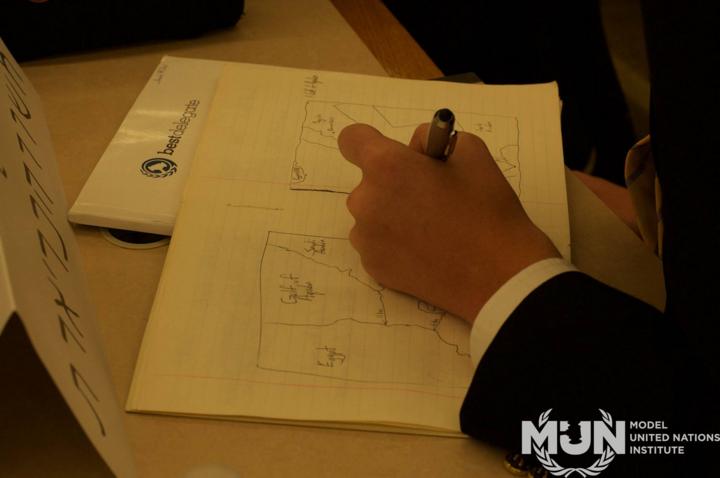- Going rogue for no reason
As often advertised, crisis committees give you the opportunity to work against the committee and wreak havoc on your fellow delegates. The image of appearing loyal in front of other delegates while playing an entirely different game through your crisis notes is an intriguing one, but newcomers often make the mistake of thinking that it is the only path to crisis. These delegates try to work against the committee without considering whether or not their course of action is accurate to the individuals they represent. This frequently translates to poorly-made crisis arcs that end in nuclear war, revolution, or some form of regicide that only serves to further you from awards and inconvenience the backroom.
A delegate whose crisis arc is solely rooted in the end goal of taking over the committee can become a thorn in the side of a backroom trying to create a narrative from cooperative crisis notes. Chairs and backrooms invest a lot of time into the positions that make up their committee, and will recognize when a treacherous crisis arc is inaccurate given the motives of the delegate’s position. When a delegate begins to go rogue out of the blue, not only does it demonstrate poor research on their part, but also a preoccupation with FunMUN-esque maneuvers in place of intelligent strategy.
However, this is not to say that delegates can never advance their personal agendas through shady crisis notes. The difference here is that they accurately portray the extent a position would act in an underhanded manner, and may still forward the goals of a committee, albeit not the exact goals being pursued in room. If executed well, these types of notes can impress backrooms and result in their own crisis updates, improving your standing in the committee. Finding the line between warranted and unwarranted crisis arcs requires a lot of research into political goals of the individuals you represent, but it will ultimately pay off in improving your in-committee performance.

- Writing too much for your crisis notes
Crisis notes are arguably the most unique mechanism in crisis committees, as they allow delegates to directly alter the course of their simulations. As such, delegates are right to approach the content of their crisis notes carefully. Every word matters, as the backroom receiving your crisis notes will actively search for holes in them to undermine your crisis arc, especially when your commands are shady. While some delegates take this to mean that crisis notes have to be pages long, this mindset can only worsen the time crunch delegates face in a crisis committee.
Whenever delegates write crisis notes in the form of paragraph-long letters, they run the risk of creating more holes in their crisis arc than they were trying to patch up. This is because lengthy crisis notes are almost always full of unnecessary fluff that backroom can use to hinder crisis arcs. Even if we assume that backroom will let the note by, the time took to write it would alone hurt delegates’ performance. Since crisis committees force delegates to address a never-ending stream of crisis updates, those extra minutes it takes to write a crisis note can become a significant setback. Furthermore, crisis notes meant to address a recent update can be rendered irrelevant if delegates spend too much time on them.
The best crisis notes are those that get straight to the point with action orders. These are also the notes that staff don’t dread receiving, and can easily comprehend – they’ll appreciate this! Bulleted points that provide sufficient information will allow delegates to advance their crisis arc and focus on other aspects of the committee. With all this said, detail can be fantastic – but if you’re the type of delegate to write several pages at a time, add a summary at the end. Fundamentally, the best advice out there would be to KISS (Keep It Simple, Stupid).
- Underestimating the directive
Rather than culminating in a multi-page resolution like General Assemblies, crisis committees collectively respond to crisis updates and advance their interests through directives. These documents, although shorter in length, are integral to the flow of crisis committees as they represent an action order from the committee. Despite its importance, delegates new to crisis can be apathetic to the directive-writing process in favor of crisis notes. While there is less of an opportunity to advance crisis arcs because of the of the public nature of directives, they allow delegates to show their chairs that they can effectively balance in-committee and out-committee action. This balance is vital for those interested in awards, as it allows them to stand out in the midst of delegates either focusing too much on crisis notes or too much on speeches and directives. Additionally, it’s especially impressive when a delegate can tie their personal notes into a directive – without anyone in room knowing.
If you are still learning the basics of crisis committees, consider checking out the Best Delegate series on crisis!


